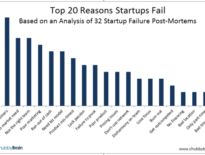
This question stumbled across my Quora and I was struck by the notion that too many incubators fail to incubate viable companies.
I found myself wondering, what does it really mean to be a startup incubator? Are such programs actually doing something, week after week, so that the founders therein develop something? Why was the question asked if not for at least someone, one person, having an experience in which they’re not sure they’re getting what they should from an incubator?
Full disclosure, I’m a regional Director in the Founder Institute program (Founder Institute Austin) so I am exploring this from a matter of perspective.
That program, our work in Founder Institute, is a voluntary commitment on our part (read: we’re not paid) and we only see a benefit if/when founders successfully graduate AND exit.
Incubators are NOT social clubs, office space, nor mentor networks. If that’s all you’re getting from (or paying for) of one, please, write a review of it online so others don’t fall into an “Incubator” that isn’t.
Social clubs are networking groups
Office space is coworking
Mentor networks are freely available via LinkedIn
I’m not going to share the intricacies of the FI model, that’s a different thread and discussion, but I’ll allude to it as it explains why I’m investing in my time to bring that program to Texas.
An Incubator is a Idea/Seed stage curriculum that develops from founder to company.
Later stage with a focus on growth, sales, substantial funding, etc. is acceleration of a business. That’s an Accelerator.
An incubator is, in every sense of the word, the investment of energy that turns an egg into something viable.
Begging the question of that curriculum; the question I was asked:
What should the week by week activities look like for a top startup incubator?
Call it 10–15 weeks. I think that’s the sweet spot at this stage as the right set of mentors, tools, and time can get a founder through all of this that quickly.
Let’s break it down:
- Idea Validation – 500 interviews on the street!
- Market Development – NOT promotion! Do the market research; size, competition, funding sources, exit possibilities, history
- Customer Development – WHO might buy, why, at what price, how?
- Revenue Model – How to build it, what it might forecast out, how to budget against, how to test and pivot it?
- Branding and Design – Only after all the above. This doesn’t matter without the former
- Legal – Entity structure, formation, agreements
- Go To Market – How to Launch
- Product Development – Planning what to build, when, where, with whom, and how
- Patents, IP, Copyright, and NDAs – No NDAs! The rest might matter
- Hiring and Onboarding – Equity based team, HR / employees, partners
- Growth Plan – Investments, promotion, advertising, optimization, etc.
- Equity and Cap Table – Valuations, vesting, typical conventions
- Exit Strategies – Developing the right targets, network, partners, and IP / Assets to achieve this
- Funding Strategy and Plan – Angels or VC viable? Financing instead of funding. SAFE Notes, Convertible Debt, etc.
The program you join is likely locally run so your mileage may vary, even within the samely branded program (Techstars is run by cities or regions, for example). Whether or not you should consider one is another question recently explored, here.
Bottom line, there should be a structured program, expectations, and resources that align with that stage in the program. Mentors aren’t there for office hours, they’re there to help make sure you exit that week, and the program, with a viable business.



thanks sir.
Off the top of my head we have all the above at the TMC Innovation Institute plus sessions on budgeting and procurement process for hospitals, value prop canvas workshop, marketing and sales strategies, pricing and reimbursement, FDA regulatory process, preclinical and clinical testing, design/prototyping/manufacturing/testing/QA, media and social media strategy and skills training, structuring pilots and deals, clinical trials, HIPAA, data security, licensing terms, international strategy, creating and following mission/vision/values culture in the company and executive coaching. I am sure I am missing several sessions and workshops and obviously some of these are healthcare specific but hey, that’s what we do at TMCx!
Aside from the healthcare specific (damn, that’s impressive!), structuring pilots and deals, international strategy, and company mission/culture, are solid big picture additions! Thank you! Rest (my opinion), are covered in the others
was going to mention any operational or ongoing burn and cost analysis.
add Compliance with #9?
Love your Quora answers btw!
Thanks Judah Ross! Pay it Forward! 🙂
Good distinctions. It’s still my impression that a lot of people are drawn to, and run incubators as social clubs. Many want to work, or have value to share, but hope to glom on others who have the organizing vision. That’s part of the organic process though, right?
You referring to the founder entourage issue?
Not fluent in the terminology, but that sounds about right. More are looking for a founder, not sure when one will emerge. Like a hive of drones in search of a queen. Meantime, there’s beer and potential for hook ups. ?
An idea I’ve heard only recently. That as founders get attention, an entourage follows; and that the challenge for startups is distinguishing: co-founder / employee / advisor / follower (entourage)
Startups seem to fail because they bring the entourage on to the team.
Seriously. Been there, done that. Have the t-shirts. I want to send several founders I know through ^^ program
Agreed. Taught by a community of like minded people with unique experiences
In my experience there was a fairly large divergence in the quality of so-called “incubators” in the Austin ecosystem. Fundamentally I feel like they suffer from many of the same problems that a VC business model suffers from. There are so many bad ideas and teams out there and many other opportunities that simply have a poor choice of timing for whatever reason. In order to make a business viable to incubate in this environment you necessarily seem to have to default to behavior that either biases extracting rent from starry-eyed Tech Crunch hopefuls or relies on a previous track record to de-risk new concerns, which seems to provide assistance to those who benefit from it far less. Kudos to those out there who can add real value for entrepreneurs and have engagements set up to create alignment such that all concerned are incentivized to pull on the same end of the rope while educating and filling gaps for founding teams with realistic expectations who are coachable.
You have equity based team before the equity/cap table line on the list, wondering how you can effectively distribute equity to your first employees without at least a draft of that.
Works well in my experience. First is about culture, fit, roles, norms, vesting, implications, etc. as a team. It’s more the founder/team perspective on it. Then it’s valuations, share types, stages, and allocations in raising. It’s the company/funding perspective on it.
Ordering works well in programs like FI because most founders focus their understanding of equity and valuations on funding, neglecting the team considerations (which are, arguably, more important). Cart before horse kind of thing.
I was incubated at ideaSpace-University of Cambridge, UK a while back. It is very different than here in the US and there are things to be learned from both models. A few things I would add to the above. 1)rigorous flushing out of possible business models and then probable models (RE: Alex Osterwalder) 2)peer to peer advisory 3)a safe zone for founders to be open with each other about what is going on without fear of gossip. Lastly, true entrepreneurs are of a certain ilk at a young age and can be very helpful even without a great deal of ‘experience’.